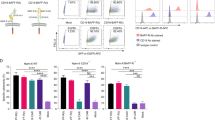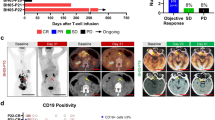Abstract
Purpose
Although adoptive cell therapy with chimeric antigen receptor (CAR)-engineered T cells has shown durable clinical efficacy in patients with CD19+ B cell malignancies, the application of this approach to solid tumors is challenging. The goal of this proof-of-concept study was to investigate whether loading of CD19-CAR T cells (CART19) with anti-HER2 or anti-EGFR bispecific antibodies (BiAb) will target HER2+/EGFR+ CD19− targets and signal the intracellular domain of CAR without engaging antigen-specific CD19 ScFv of CAR T cells.
Methods
We used CART19 armed with anti-CD3 (OKT3) × anti-HER2 BiAb (HER2Bi) or anti-CD3 (OKT3) × anti-EGFR BiAb (EGFRBi) to evaluate the cytotoxicity directed at HER2 or EGFR expressing cancer cell lines compared with unarmed CART19 measured by short-term 51Cr release assay and long-term real-time cell analysis using xCelligence. We also determined the differences in exhaustion or effector phenotypes and cytokine profiles during the short- and long-term cytotoxicity assays.
Results
Specific cytotoxicity was exhibited by CART19 armed with HER2Bi or EGFRBi against multiple tumor cell lines. Armed CART19 and armed activated T cells (ATC) showed comparable specific cytotoxicity that ranged between 10 and 90% against breast, pancreatic, ovarian, prostate, and lung cancer cell lines at 10:1 E/T ratio. Serial killing (repeated killing) by HER2Bi-armed CART19 ranged between 80 and 100% at 10:1 E/T ratio against MCF-7 cells up to 19 days (up to 4th round of repeated killing) measured by a real-time cell analysis without CART19 becoming exhausted.
Conclusions
HER2Bi- or EGFRBi-armed CART19 exhibited specific cytotoxicity against multiple HER2+/EGFR+/CD19− tumor targets in overnight and long-term serial killing assays. CART19 showed improved survival and were resistant to exhaustion after prolonged repeated exposure to tumor cells.





Similar content being viewed by others
References
Beatty GL et al (2014) Mesothelin-specific chimeric antigen receptor mRNA-engineered T cells induce anti-tumor activity in solid malignancies. Cancer Immunol Res 2:112–120
Di Stasi A, Tey SK, Dotti G, Fujita Y, Kennedy-Nasser A, Martinez C et al (2011) Inducible apoptosis as a safety switch for adoptive cell therapy. N Engl J Med 365:1673–1683
Grabert RC, Cousens LP, Smith JA, Olson S, Gall J, Young WB, Davol PA, Lum LG (2006) Human T cells armed with Her2/neu bispecific antibodies divide, are cytotoxic, and secrete cytokines with repeated stimulation. Clin Cancer Res 12:569–576
Grupp SA, Kalos M, Barrett D, Aplenc R, Porter D, Rheingold S et al (2013) Chimeric antigen receptor-modified T cells for acute lymphoid leukemia. N Engl J Med 368:1509–1518
Guedan S, Ruella M, June CH (2019) Emerging cellular therapies for cancer. Annu Rev Immunol 26(37):145–171
Lamers CH, Sleijfer S, van Steenbergen S, van Elzakker P, van Krimpen B, Groot C et al (2013) Treatment of metastatic renal cell carcinoma With CAIX CAR-engineered T cells: clinical evaluation and management of on-target toxicity. Mol Ther 14:904–912
Lamers CH, van Steenbergen-Langeveld S, van Brakel M, Groot-van Ruijven CM, van Elzakker PM, van Krimpen B, Sleijfer S, Debets R (2014) T cell receptor-engineered T cells to treat solid tumors: T cell processing toward optimal T cell fitness. Hum Gene Ther Methods 25(6):345–357
Lum LG, Thakur A, Al-Kadhimi Z, Colvin GA, Cummings FJ, Legare RD, Dizon DS, Kouttab N, Maizel A, Colaiace W, Liu Q, Rathore R (2015) Targeted T-cell therapy in stage IV breast cancer: a phase I clinical trial. Clin Cancer Res 21:2305–2314
Porter DL, Levine BL, Kalos M, Bagg A, June CH (2011a) Chimeric antigen receptor-modified T cells in chronic lymphoid leukemia. N Engl J Med 365:725–733
Porter DL, Kalos M, Zheng Z, Levine B, June C (2011b) Chimeric antigen receptor therapy for B-cell malignancies. J Cancer 2:331–332
Reusch U, Sundaram M, Davol PA, Oson SD, Davis JB, Demel K, Nissim J, Rathore R, Liu PY, Lum LG (2006) Anti-CD3 × anti-epidermal growth factor receptor (EGFR) bispecific antibody redirects T-cell cytolytic activity to EGFR-positive cancers in vitro and in an animal model. Clin Cancer Res 12(1):183–190. https://doi.org/10.1158/1078-0432.CCR-05-1855
Sen M et al (2001) Use of anti-CD3 × anti-HER2/neu bispecific antibody for redirecting cytotoxicity of activated T cells toward HER2/neu + tumors. J Hematother Stem Cell Res 10(2):247–260
Sleijfer S, Vulto AG, Kruit WH, Kliffen M, Debets R et al (2006) Treatment of metastatic renal cell carcinoma with autologous T-lymphocytes genetically retargeted against carbonic anhydrase IX: first clinical experience. J Clin Oncol 24:e20–e22
Thakur A, Rathore R, Kondadasula SV, Uberti JP, Ratanatharathorn V, Lum LG (2018) Immune T cells can transfer and boost anti-breast cancer immunity. Oncoimmunology 7:e1500672
Uberti JP, Joshi I, Ueda M, Martilotti F, Sensenbrenner LL, Lum LG (1994) Preclinical studies using immobilized OKT3 to activate human T cells for adoptive immunotherapy: optimal conditions for the proliferation and induction of non-MHC-restricted cytotoxicity. Clin Immunol Immunopathol 70(3):234–240
Ueda M, Joshi ID, Dan M, Uberti JP, Chou TH, Sensenbrenner LL, Lum LG (1993) Preclinical studies for adoptive immunotherapy in bone marrow transplantation, Generation of anti-CD3 activated cytotoxic T cells from normal donors and autologous bone marrow transplant candidates. Transplantation 56(2):351–356
Vaishampayan U, Thakur A, Rathore R, Kouttab N, Lum LG (2015) Phase I study of anti-CD3 × anti-Her2 bispecific antibody in metastatic castrate resistant prostate cancer patients. Prostate Cancer 2015:285193
Watanabe K, Kuramitsu S, Posey AD Jr, June CH (2018) Expanding the therapeutic window for CAR T cell therapy in solid tumors: the knowns and unknowns of CAR T cell biology. Front Immunol 9:2486
Acknowledgements
The data presented in this manuscript are original and have not been published elsewhere except in the form of abstracts and poster presentations at symposia and meetings.
Funding
This study was primarily supported by funding from in part by R01 CA 182526, P30CA022453 (Microscopy, Imaging, and Cytometry Resources Core) and startup funds from the University of Virginia Cancer Center.
Author information
Authors and Affiliations
Contributions
LGL and CHJ conceived the idea. AT, LGL, CHJ and JS designed the study, performed statistical analysis, and wrote the manuscript. AT, JS and DLS performed the experiments and participated in the data analysis. All authors read and approved the final manuscript.
Corresponding authors
Ethics declarations
Conflict of interest
LGL is co-founder of Transtarget Inc. and serves on the SAB for Rapa Therapeutics, CHJ is a co-founder of Tmunity Therapeutics, Inc. and AT is co-founder of Nova Immune Platform LLC, JS and DLS have no conflict of interest.
Additional information
Publisher's Note
Springer Nature remains neutral with regard to jurisdictional claims in published maps and institutional affiliations.
Rights and permissions
About this article
Cite this article
Thakur, A., Scholler, J., Schalk, D.L. et al. Enhanced cytotoxicity against solid tumors by bispecific antibody-armed CD19 CAR T cells: a proof-of-concept study. J Cancer Res Clin Oncol 146, 2007–2016 (2020). https://doi.org/10.1007/s00432-020-03260-4
Received:
Accepted:
Published:
Issue Date:
DOI: https://doi.org/10.1007/s00432-020-03260-4




